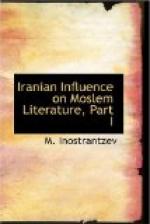[Footnote 2: In connection with the art of the Persian calligraphist and illustrative of the Sasanian epoch stand the indications of the ancient Moslem writers regarding the Avesta, which is reported to have been inscribed by Zoroaster in gold ink on parchment and also writings in gold ink of certain ancient Persian books. According to the Zafar Nameh, Anushirwan directed that the maxims of Buzurjamihr should be written down in golden water,—(ba-abizar). From early Sasanians also comes the custom of writing on valuable parchment or paper. Masudi speaks of the purple ink of these books.]
[Footnote 3: See Browne, “A Literary History”, I, 165-166.]
Now we revert to the supposition of Gutschmid. Had he known the quotations from the Book of Taj in Uyunal Akhbar he would have adduced them in confirmation of his hypothesis, and he would have compared the book mentioned by Masudi with the Book of Taj referred to among the Persian books enumerated in the Fihrist. On the basis of the last-mentioned work it may be affirmed that in the Sasanian times there existed a certain Taj Nameh comparable to the Khuday Nameh and the Ain Nameh. The extracts in the Uyunal akhbar do not contain anything of a special nature with reference to king Anushirwan so that the Book of Taj on the “Acts of Anushirwan” mentioned in the Fihrist among the books of Ibn al Mukaffa could hardly have comprised what has been quoted in Uyunal akhbar. The materials at our disposal are too scanty to establish its relation with the Sasanian Book of Taj.[1]
[Footnote 1: The supposition (Zotenberg, Thaalibi XLI,) according to which Firdausi saw an illustrated “Book of Kings” rests on a misunderstanding. The fact is that certain verses have been incorrectly translated by Mohl (IV, 700-701, Verses 4071-4075).
Mohl translated the passage as follows: “There was an aged man named Azad Serw who lived at Merv in the house of Ahmad son of Sahl; he possessed a book of kings in which were to be found the portraits and figures of the Pehlwans. He was a man with a heart replete with wisdom and a head full of eloquence, and a tongue nourished with ancient tradition; he traced his origin to Sam, son of Nariman, and he knew well the affairs regarding the fights of Rustam.”
A more correct translation would be: “There was a certain old man by name of Azad Serw living in Merv with Ahmad son of Sahl. He had a Book of Kings. In figure and face he was a warrior; his heart was full of wisdom, his head full of eloquence, and in his mouth there ever were stories of the ancient times. He traced his origin back to Sam, son of Nariman, and preserved in his memory many a tale of the battles of Rustam.”]
CHAPTER VI
The list of the translators from Persian into Arabic as given in the Fihrist, (244, 25-245, 6) 75




